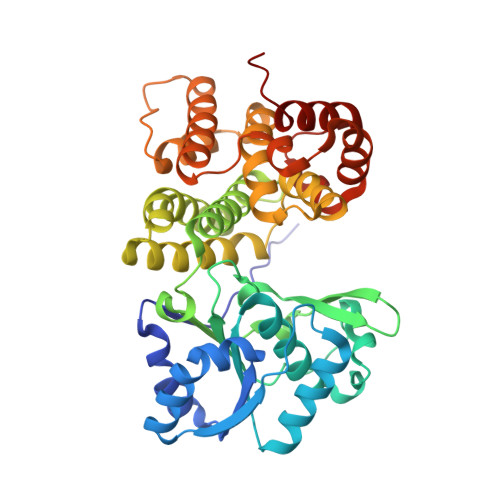Structures of lactaldehyde reductase, FucO, link enzyme activity to hydrogen bond networks and conformational dynamics.
Zavarise, A., Sridhar, S., Kiema, T.R., Wierenga, R.K., Widersten, M.(2023) FEBS J 290: 465-481
- PubMed: 36002154
- DOI: https://doi.org/10.1111/febs.16603
- Primary Citation of Related Structures:
7QNF, 7QNI, 7QNJ, 7R0P, 7R3D, 7R5T - PubMed Abstract:
A group-III iron containing 1,2-propanediol oxidoreductase, FucO, (also known as lactaldehyde reductase) from Escherichia coli was examined regarding its structure-dynamics-function relationships in the catalysis of the NADH-dependent reduction of (2S)-lactaldehyde. Crystal structures of FucO variants in the presence or absence of cofactors have been determined, illustrating large domain movements between the apo and holo enzyme structures. Different structures of FucO variants co-crystallized with NAD + or NADH together with substrate further suggest dynamic properties of the nicotinamide moiety of the coenzyme that are important for the reaction mechanism. Modelling of the native substrate (2S)-lactaldehyde into the active site can explain the stereoselectivity exhibited by the enzyme, with a critical hydrogen bond interaction between the (2S)-hydroxyl and the side-chain of N151, as well as the previously experimentally demonstrated pro-(R) selectivity in hydride transfer from NADH to the aldehydic carbon. Furthermore, the deuterium kinetic isotope effect of hydride transfer suggests that reduction chemistry is the main rate-limiting step for turnover which is not the case in FucO catalysed alcohol oxidation. We further propose that a water molecule in the active site - hydrogen bonded to a conserved histidine (H267) and the 2'-hydroxyl of the coenzyme ribose - functions as a catalytic proton donor in the protonation of the product alcohol. A hydrogen bond network of water molecules and the side-chains of amino acid residues D360 and H267 links bulk solvent to this proposed catalytic water molecule.
Organizational Affiliation:
Department of Chemistry - BMC, Uppsala University, Sweden.















